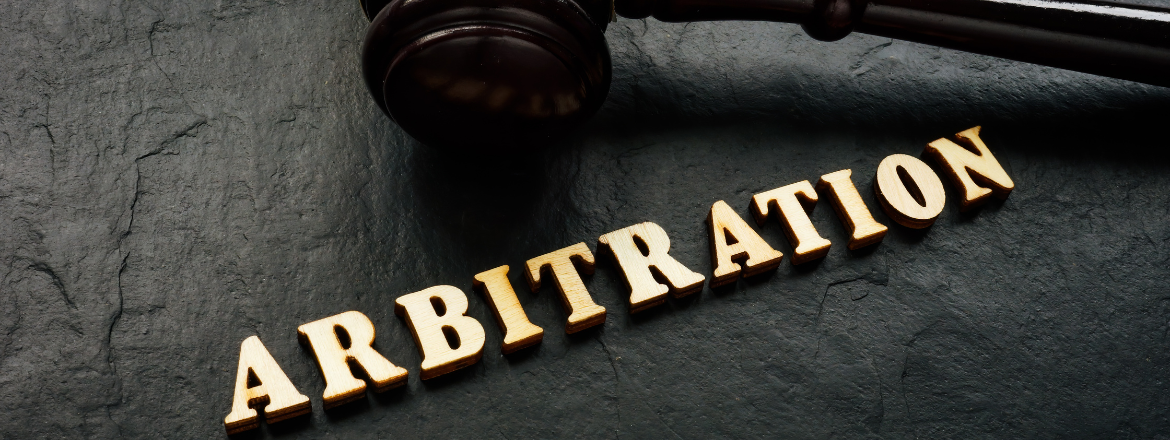A Guide to Intellectual Property Arbitration

Table of Contents
Introduction
In the nuanced domain of intellectual property, laws are in place and specifically designed to discourage the intent of violating them. Intellectual properties such as copyrights, trademarks, trade secrets, and patents are methodically constructed to protect their holders. Hence, in the event of infringement, aggrieved parties have the ability to defend their intellectual assets through legal action (such as IP Arbitration), thereby discouraging any illegal use by third parties in the present or in the foreseeable future.
This, in theory, is what IP enforcement is, and it takes the visage of enforcement steps to resolve disputes, such as:
- Negotiation
- Mediation
- Arbitration
- Litigation
- Settlement
What is Arbitration?
Arbitration is described as the premier non-court dispute resolution method available. The nature of initiating these proceedings can either be:
- Ad-hoc: Where the rules and procedures are tailored and jointly agreed upon by the parties involved.
- Under Arbitral Institute Administration: In this scenario, the disputing parties opt to conduct the proceedings under the oversight of a specialized arbitral tribunal affiliated with an arbitration institute.
Its notable attributes, in comparison to other legal actions, are:
- Consent: Arbitration begins with a mutual agreement between the parties, which is often entrenched in the terms of a relevant contract. If a contractual disagreement or infringement arises, arbitration can be invoked with the parties' consent. Unlike mediation, once arbitration begins, all relevant parties cannot unilaterally withdraw from the process.
- Election of Specialized Arbitrator: Participating parties retain the autonomy to elect the arbitrator or an arbitral tribunal of their own accord. Conversely, esteemed arbitral institutions can offer suggestions for arbitrators possessing relevant expertise.
- Objective Neutrality: Parties hold the privilege to select arbitrators who embody impartiality and neutrality. Furthermore, they have the liberty to choose pivotal factors that reduce any potential advantage possessed by the opposing party, such as the applicable law, language, and location for the arbitration hearings.
- Confidentiality: One of the fundamental principles of arbitration is privacy, which is overseen by regulatory bodies. Parties to arbitration have the ability to put together their agreement with a focus on maintaining the confidentiality and integrity of sensitive material, including valuable trade secrets. This is a significant advantage of choosing arbitration over litigation, as court decisions and case records may become public domain depending on jurisdiction, as witnessed in countries such as the US. The ability to maintain anonymity about the outcome of the dispute and the use of commercially confidential information highlight arbitration's appeal and remain a key factor for parties opting for this method over traditional litigation avenues.
- Absolute and Enforced Rulings: The relevant parties must swiftly comply with the arbitral tribunal's final ruling once it is issued. The "New York Convention" permits local courts to recognize and uphold international arbitration rulings in circumstances that need cross-border enforcement.
What is an Arbitral Tribunal?
An Arbitral Tribunal, also referred to as an arbitration tribunal, arbitration commission, arbitration committee, or arbitration council, is a body of adjudicators known for their neutrality and unbiased stance. Tasked with convening and facilitating the resolution of arbitration-related conflicts, this tribunal may comprise a single arbitrator or multiple members. Typically, its members are seasoned experts with legal and mediation experience.
What are Arbitral Institutes?
Arbitral institutes are esteemed entities dedicated to facilitating the resolution of arbitral disputes. They achieve this by providing structured venues governed by administrative regulations, as opposed to the ad hoc nature of other dispute resolution approaches. Along with this principal duty, they frequently provide supplementary services similar to a court registry, such as handling filings and keeping records of relevant documents.
However, in most cases, these institutes refrain from direct involvement in the arbitral proceedings once they are set in motion. The extent of their supervision varies depending on the specific institute and its policies.
Although there are hundreds of arbitral institutions in existence today, a small number of well-known ones handle the majority of arbitral matters worldwide.
These include, but are not limited to:
- International Chamber of Commerce (ICC)
- London Court of International Arbitration (LCIA)
- Permanent Court of Arbitration (PCA)
- Stockholm Chamber of Commerce Arbitration Institute (SCC)
- Swiss Chambers’ Arbitration Institution (SCAI)
- The International Centre for Dispute Resolution (ICDR), in the international branch of the American Arbitration Association (AAA)
- Singapore International Arbitration Centre (SIAC)
- Hong Kong International Arbitration Centre (HKIAC)
- China International Economic and Trade Arbitration Commission (CIETAC)
- Arbitration Center of the World Intellectual Property Organization (WIPO)
What is the New York Convention?
The New York Convention, also known as the "New York Arbitration Convention," was established in 1958 following a diplomatic assembly held under the aegis of the United Nations. Its major goal is to develop a consistent legislative framework for recognizing arbitration agreements and implementing consistent foreign and non-domestic arbitral rulings through judicial means. As a result, parties to arbitration are required to uphold the recognition of such awards, whether they transcend national borders or are domestic in nature.


What are the Advantages of Arbitration?
When it boils down to IP-related disputes, arbitration tends to emerge as the favored option, with significant advantages over local legal forums. This inclination becomes especially obvious when parties involved in a commercial relationship face cross-border intellectual property concerns.
These advantages include:
- Single Court Resolution: Arbitration allows parties to resolve international disputes that span across multiple countries in a single forum.
- Time and Cost Effective: The ability for parties to resolve international disputes in one court opens up an avenue for cost-and time-cutting strategies such as legal fees or summoning testifying witnesses once.
- Control Over the Dispute Process: Arbitration allows parties to possess the leeway to dictate many elements of their court proceedings in order to assure a fair hearing.
- Neutral Umpiring: When choosing their arbitrator, parties can exercise varying degrees of quality control through arbitration. giving them the autonomy to choose the presiding arbitrator(s) themselves, considering their nationality or area of expertise relevant to the case in order to guarantee an objective hearing.
- Confidentiality: It is very possible that in significant intellectual property conflicts, the case will feature highly sensitive data, such trade secrets of a corporation. Through arbitration, parties can customize their agreement to include a level of confidentiality that will protect this information from public eyes.
- Ease of Enforcement: Under the New York Convention, the final decision in an arbitration has the added benefit of being enforced easily among members of contracting states.
- Provisional and Urgent Measures: In certain areas, state courts may not be able to issue interim remedies or injunctive relief, which arbitral tribunals have the power to provide. These kinds of opportunities are extremely significant in cases involving intellectual property, particularly when they can stop the distribution of products that infringe upon IP rights, protect trade secrets, or avoid non-disclosure agreements from being broken.
- Procedural Flexibility: The arbitral process affords parties the liberty to tailor the dispute settlement procedure to their own needs. Together, they may set important parameters like due dates, steps in the process, and documentation, all of which can be customized to meet the particular requirements of each case. This flexibility comes in especially handy when there's a tight deadline and quick thinking is required. To further improve convenience and effectiveness, parties may choose to have the hearing in another locale or perform it online via teleconference.
- Finality: Once a ruling has been finalized in the dispute, the opportunity to appeal becomes very limited, which, in perspective, can be viewed as advantageous.
What is an Expedited Arbitration?
Expedited arbitration is a streamlined option of arbitration provided by some arbitral tribunals. Its aim is to offer a quicker and possibly more economical solution than the traditional process and is defined by the following crucial principles:
- Single Arbitrator: In order to accelerate the resolution process and speed decision-making, expedited arbitration usually entails the appointment of a single arbitrator.
- Limited Pleadings: In expedited arbitration, there is only a single exchange of pleadings, in contrast to ordinary arbitration. The proceedings proceed quicker and with less procedural intricacy thanks to this.
When to use Expedited Arbitration over Traditional Arbitration?
Given its cost and time savings, expedited arbitration is advised for simple conflicts, particularly those that do not require considerable evidence production, expert analysis, or lengthy hearings. The decision to choose expedited arbitration is best made by considering the following factors:
- Value in Dispute: When the amount at stake does not warrant the expense associated with more elaborate procedures, expedited arbitration may be the go-to route.
- Limited Issues: In circumstances where there exist only a few disputed difficulties, expedited arbitration might be used to hasten the resolution process.
- Need for Prompt Resolution: Parties seeking a swift and enforceable decision within a short timeframe may find expedited arbitration to be the ideal solution.
- Ambitious Time/Cost Framework: In situations where parties aim to adhere to a stringent time and cost framework, expedited arbitration offers a viable option, provided that adjustments can be made based on case developments.
Conclusion
Arbitration gives parties the capacity to settle their disputes rapidly and discreetly due to its consensual process and unbiased arbiters. Parties may acquire needs-specific, structured conflict resolution with the assistance of arbitral institutes. Conventional arbitration is still a strong option for complicated issues, even though expedited arbitration provides an alternative for a fast resolution. Ultimately, the decision of employing arbitration constitutes a strategic balancing between cost-effectiveness, efficiency, and the pursuit of an impartial result.
Abou Naja Intellectual Property is the place to go for knowledgeable advice and astute legal assistance when handling intellectual property problems. Our skilled group of experts focuses on precisely and successfully defending and upholding your intellectual property rights. Our commitment to protecting your intellectual property extends to IP Arbitration, litigation, and other dispute resolution processes. Get in touch with us right now to talk about your legal requirements and start safeguarding your intellectual property rights. Get in touch with us at [email protected] for a complimentary consultation.






